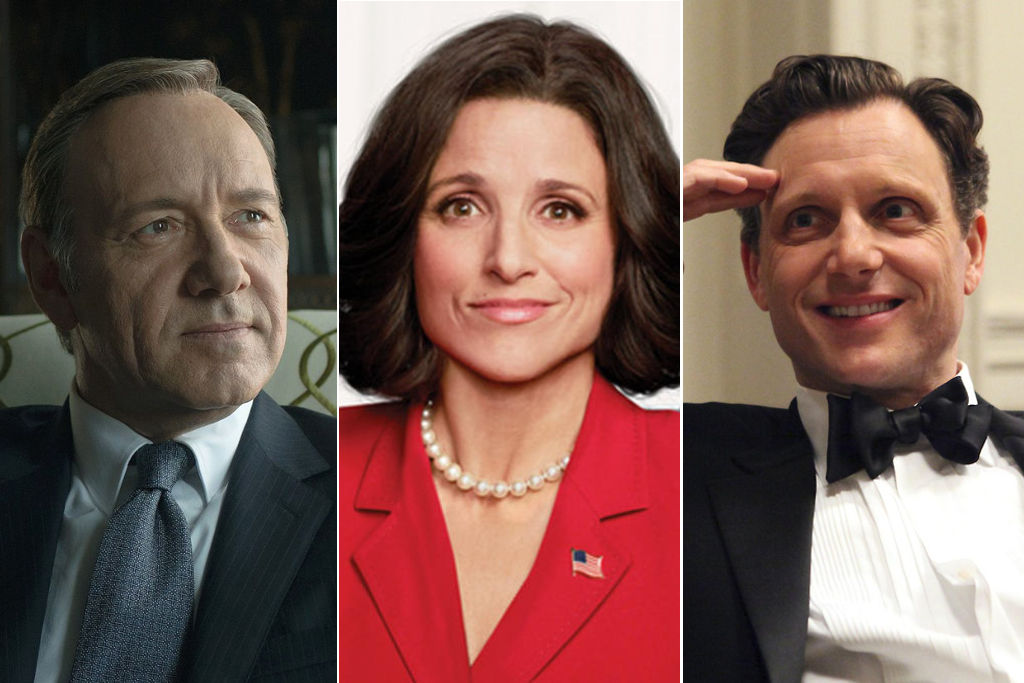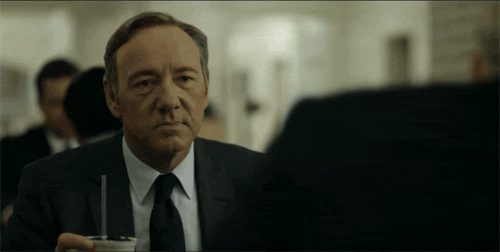Tuned In: Why Don’t TV Politicians Have Actual Policies Anymore?
WHERE'S OUR PRESIDENT BARTLET?

Tuned In is Junkee’s new fortnightly TV column. This particular instalment assumes the reader to be up-to-date with Veep and House of Cards.
–
If any character embodies the warning of ‘be careful what you wish for’, it’s Selina Meyer. The Veep has spent years pacing around in the corridor outside the Oval Office, eager to finally cross the threshold. Her naked ambition for the presidency has been in clear sight since the second episode, when Selina, played by Julia Louis-Dreyfus, struggled to contain herself upon hearing that the president is ill. Her actions in ‘Frozen Yoghurt’ were all informed by her desire for the top job — but on the surface, she’s all Clean Jobs every step of the way.
Now all of a sudden, Selina is the President, and it seems as if all her policies have gotten scared and scampered off. Having money to spend is good and causing world war three sounds bad, but that’s about as far as Veep’s politics is going these days.

It’s actually the neat inverse of the dilemma experienced by another TV VP who got a sharp push on the path to presidency. Frank Underwood spent the first two seasons on House Of Cards obsessed with climbing up the ladder in Washington, but giving no indication he had the slightest interest in doing any actual presiding once he got there. But as season three saw him get the job he’d been hankering for, the Underwood we’d come to know and revile was at a loss. Suddenly we were supposed to believe that Underwood liked full employment as much as he enjoyed murder and threesomes with the help, and the reality of the show seemed to snap as a result, unable to contort itself into a program about actual people attempting to run a country.
The other most notable president on TV right now is also completely uninterested in policy, but he boasts the distinction of not being that excited about being president at all. Scandal’s Fitzgerald Grant, aka President Emo McFreetime (HT Nick Campbell) — a man apparently so great that he has inspired brilliant and principled people to kill for him — sulks around Washington doing nothing much except pining for his girlfriend. The first series of the show was actually far cleverer than it gets credit for, showing moral people confronted by the price of power, constantly questioning what should be sacrificed for the greater good. Once power was assumed, Scandal’s characters, and the show itself, forgot to answer the question: what was it all for?
What is any of it all for? Meyer and Underwood wanted to be President more than anything, and we can assume Fitz did too, before he went in to sex-withdrawal. This is nothing revolutionary; nearly every story told about powerful people (that is, about 95% of all fiction) implies that power is an end unto itself; that some have a lust for power which rivals the lust the rest of us feel for Hemsworths, or bacon. It’s just that this lust usually runs underneath something more meaningful. I suspect even the most egomaniacal of leaders’ desire for power is matched by an equally strong conviction that they are the right person for the job; that their own personal interest in being in charge was aligned with the greater good. Would Meyer, or Underwood, or Grant honestly be able to say that their leadership was in America’s best interest? They don’t even seem to be super-aware there is an America, except every now and then they accidentally step in some.

You will have to forgive my cynicism. I am of the generation that witnessed the greatest TV Presidency there ever was. For a glorious eight years we could look to The West Wing’s President Bartlet and try to forget there actually was a President Bush. Bartlet and his staff were arrogant, of course. It would be difficult to keep an ego in check if you were commonly called a genius, were written by Aaron Sorkin, and looked like Rob Lowe. But they were principled above all else, and they referenced so many tensions in so many different policies Sorkin had to invent a new filming technique just to fit them in.
(And for any of you that would counter that Bartlet was far too cartoonish to be realistic, let me reiterate here: the actual, real live President at the time was George W Bush, a silver-spooned baby who thought he was Wyatt Earp, but was really just Yosemite Sam).
Every week there was another position paper, or amendment, or subcommittee. All of which the President and his staff cared deeply about — except for that one staff member who had somehow happened to ascend to one of the highest political offices in the country without knowing, and therefore required a fellow staff member to teach them (and us) about it.
Sorkin’s drama followed Bartlet for his full presidency, from its initial campaign (in flashback form) to his graceful retirement and replacement. Along the way, it was often observed that as President, you never get to stop running; once you win an election you’ve got vote after vote to win on the floor, and before you know it it’s midterms, and then you’re running for President again. Perhaps The West Wing owed its constant momentum to that fact – the show never really had to switch gears between pursuing power and exercising it, because it made clear that politics require people to do both, constantly, and often one at the expense of the other.
And now the two most visible Presidents on TV are floundering. Are Veep and House Of Cards intentionally trying to say that the skills required to get into office are markedly different from those needed to run it? I suspect audiences, Australians in particular, would be receptive to that message right now. But if that were the case, why would Underwood and Meyer have gotten the job so unceremoniously? The two characters may not have been engineered as skilled campaigners, but they seem even less qualified as administrators.
House Of Cards imploded once Frank got the power he’d been chasing for so long; can Veep survive it? Will Selina actually try and get any policies over the line, or will her presidency be one clusterfuck after another? Can the show survive with its lead character no longer waiting in the corridor, forever an outsider? So far season four has been pretty solid, but if Selina ever settles in to the job, the show will have to shift gears substantially to survive — and it’s a shift that HoC never successfully made.
That being said, Veep, as a screwball comedy, is better suited to the cynical, empty political age we live in than House Of Cards ever was. Maybe politics these days is just far, far too bleak to be captured by drama, and requires a heavy dose of farce to make it remotely palatable. The world of comedies is always far darker than the one dramas take place in. We might have cheered on Bartlet’s optimism and idealism in a drama, but for sitcom purposes maybe it’s enough to be both horrified and charmed by Meyer’s ineptitude and self-aggrandisement.
Thankfully, we won’t have to do it for too long. President Meyer is already back on the campaign trail, and Veep might continue doing what it does best: showing characters forever clutching at straws.
–
Season four of Veep is being fast-tracked to Showcase on Mondays at 4.30pm, with repeats at 7.30pm; House of Cards’ first three seasons are available to stream via Netflix.
–
Maddie Palmer is a writer, broadcaster, and TV and digital producer. Her work has appears on The Feed on SBS2, and she talks about TV with Myf Warhurst on Double Jay. She tweets from @msmaddiep.